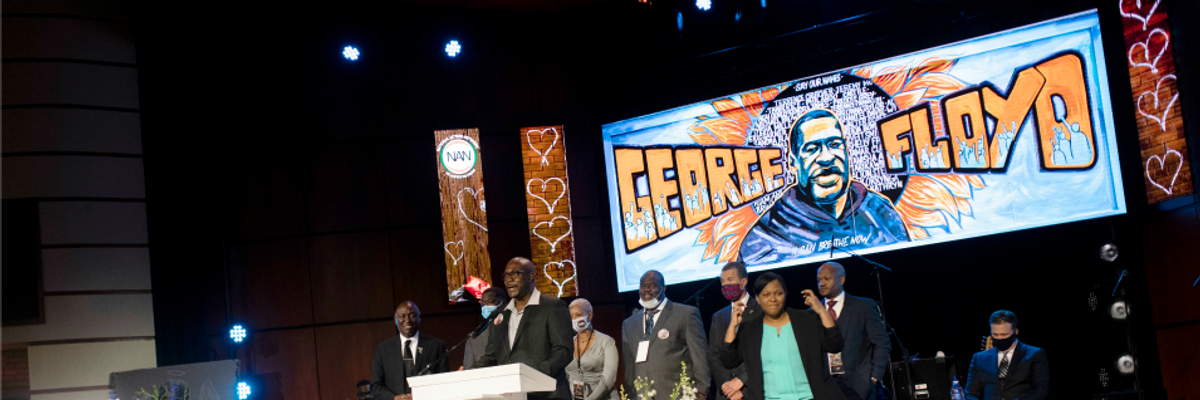Relatives of four black Americans killed by police--George Floyd, Breonna Taylor, Michael Brown, and Philando Castile--joined with over 600 rights groups Monday to demand a United Nations probe into racist policing and law enforcement's violent suppression of ongoing mass protests against police brutality and systemic racism in the United States.
"I want people across the world and the leaders in the United Nations to see the video of my brother George Floyd, to listen to his cry for help, and I want them to answer his cry."
--Philonise Floyd
The demand came in a letter to members of the U.N. Human Rights Council (HRC) signed by Floyd's brother Philonise Floyd and son Quincy Masond; Taylor's mother Tamika Palmer; Castile's mother Valerie Castile, and Brown's mother Lezley McSpadden.
Led by the ACLU and the U.S. Human Rights Network, hundreds of groups from across the globe also endorsed the letter, including Black Lives Matter, the Center for Constitutional Rights, and the NAACP.
"Mamie Till Mobley made a decision to open the casket of her son Emmett Till so the world could see the atrocities black people faced in America," Philonise Floyd said in a statement. "I want people across the world and the leaders in the United Nations to see the video of my brother George Floyd, to listen to his cry for help, and I want them to answer his cry. I appeal to the United Nations to help him. Help me. Help us. Help black men and women in America."
"The George Floyd family appeals to the United Nations to intervene in his murder," explained their attorney Ben Crump. He said that the nation has a "pattern and practice of condoning the torture and extrajudicial killing of African Americans" and "we have exhausted our domestic legal remedies on prior countless occasions to no avail."
"Now, even though the murder of black people is consistently captured on camera," Crump added, "we have yet to capture the minds and hearts of legislatures and jurors, and we have yet to capture the justice and equality promised in our Constitution and inherent in our human rights."
The letter urges the HRC to urgently convene a special session to address "the unfolding grave human rights crisis borne out of the repression of nationwide protests" that erupted after the May 25 police killing of Floyd in Minneapolis, "which was only one of a recent string of unlawful killings of unarmed black people by police and armed white vigilantes."
As Common Dreams has reported, law enforcement across the country has responded with widespread violence to the mass demonstrations demanding that communities defund the police and reinvest in community-led public safety. Peaceful protesters and reporters have endured tear gas, rubber bullets, and physical attacks by officers.
The purpose of convening a special session, the letter says, should be to mandate an independent inquiry into:
- the recent history of racist policing in cities across the country that continues with seeming impunity from the killing of Michael Brown and the repression of protests in Ferguson, Missouri, to the murder of George Floyd; and
- allegations of excessive use of force against peaceful protesters and journalists in the demonstrations in U.S.cities since the murder of George Floyd.
The letter calls for the inquiry to report its findings to the HRC and "include recommendations on how to ensure that the United States upholds its human rights obligations, including in the context of policing, protests, and assemblies."
"We believe it is important to move this issue to the international stage to highlight the hypocrisy of the U.S. government's stance, where it calls out human rights abuses abroad, but ignores government-sanctioned violence at home."
--Salimah Hankins, U.S. Human Rights Network
"Further," the letter says, "the report should address the responsibility of the United States to end impunity for police violence and other serious human rights violations through appropriate disciplinary actions, prosecutions, and fair trials."
The letter adds that the HRC should pressure the U.S. to give U.N. officials "full and unrestricted access to interview witnesses, including members of the police, to inspect places of detention, and to monitor trials related to the protests and their aftermath."
In addition to expressing concern about how law enforcement has responded to the protests, the signatories also "note with particular concern the deployment of at least 62,000 National Guard soldiers in two dozen states, the encouragement of the use of violence and mass arrests by President Donald Trump on social media, and his labeling of the protesters as 'terrorists.'"
U.S. Human Rights Network executive director Salimah Hankins said Monday that "we believe it is important to move this issue to the international stage to highlight the hypocrisy of the U.S. government's stance, where it calls out human rights abuses abroad, but ignores government-sanctioned violence at home."
Jamil Dakwar, director of the ACLU's Human Rights Program, echoed that sentiment, declaring that "it is time the United States face the same scrutiny and judgement it is quick to pass on to other countries."
"This accountability appeal to the United Nations follows the legacy of great black leaders such as W.E.B. Du Bois, Martin Luther King, Jr., and Malcolm X who believed in internationalizing the struggle for human rights and racial justice in the United States," Dakwar noted.
"As communities in the United States call on their leaders to divest from policing and end structural racism," he said, "the United Nations must support these domestic demands by holding the United States accountable for its human rights violations."
The letter comes after U.N. High Commissioner for Human Rights Michelle Bachelet said last week that the voices calling for an end to the killings of unarmed black Americans, police violence, and the "endemic and structural racism that blights U.S. society need to be heard." She also condemned violence against protesters and journalists and called for "a profound examination of a wide range of issues, including socio-economic factors and deep-seated discrimination."

